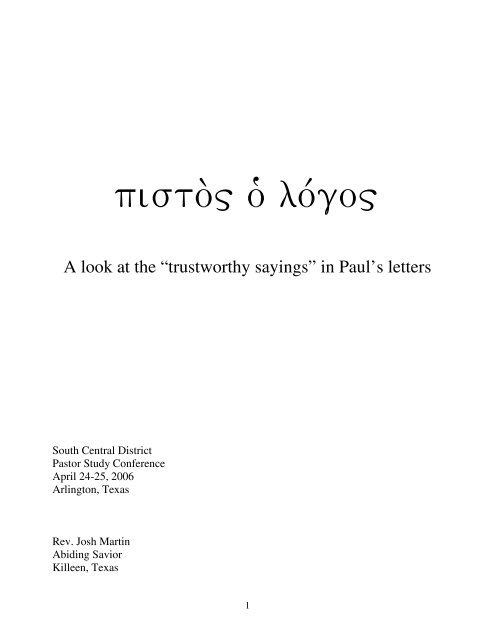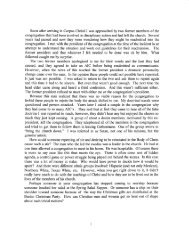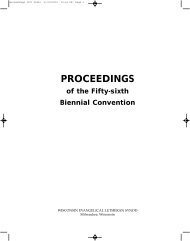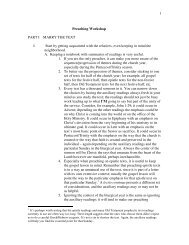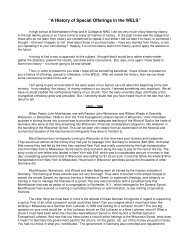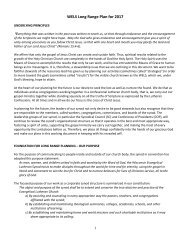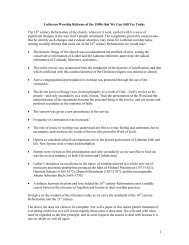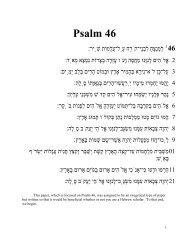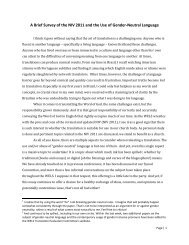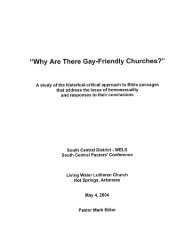Exegesis of Paul's, âThis is a Trustworthy Sayingâ - The South ...
Exegesis of Paul's, âThis is a Trustworthy Sayingâ - The South ...
Exegesis of Paul's, âThis is a Trustworthy Sayingâ - The South ...
You also want an ePaper? Increase the reach of your titles
YUMPU automatically turns print PDFs into web optimized ePapers that Google loves.
p<strong>is</strong>to;" oJ lovgo"<br />
A look at the “trustworthy sayings” in Paul’s letters<br />
<strong>South</strong> Central D<strong>is</strong>trict<br />
Pastor Study Conference<br />
April 24-25, 2006<br />
Arlington, Texas<br />
Rev. Josh Martin<br />
Abiding Savior<br />
Killeen, Texas<br />
1
Scattered throughout three <strong>of</strong> h<strong>is</strong> letters (1 & 2 Timothy and Titus) the apostle Paul writes down<br />
what he d<strong>is</strong>tingu<strong>is</strong>hes as five trustworthy sayings. What are these trustworthy sayings? <strong>The</strong>y are<br />
just that. <strong>The</strong>y are sayings. <strong>The</strong>y appear to be things that were being said or sung in the Chr<strong>is</strong>tian<br />
community at the time <strong>of</strong> Paul. Paul uses these statements in h<strong>is</strong> letters because they are true and he<br />
wants to draw attention to them. That Paul d<strong>is</strong>tingu<strong>is</strong>hes these five sayings as trustworthy does not<br />
mean he <strong>is</strong> elevating them above all <strong>of</strong> the other things he says in h<strong>is</strong> letters. He <strong>is</strong> merely drawing<br />
attention to some good things that other Chr<strong>is</strong>tians were saying or singing.<br />
For the purpose <strong>of</strong> th<strong>is</strong> paper we will first look at the trustworthy saying “formula.” A part <strong>of</strong> the<br />
formula, or all <strong>of</strong> it, <strong>is</strong> used with each <strong>of</strong> the five trustworthy sayings. After looking at “the<br />
formula,” we will then look at each <strong>of</strong> the five trustworthy sayings in the order that they appear in<br />
Paul’s writings. <strong>The</strong> five sayings are located in 1 Timothy 1:15, 3:1, 4:9; 2 Timothy 2:11; and Titus<br />
3:8.<br />
15 p<strong>is</strong>to;" oJ lovgo" kai; pavsh" ajpodoch`" a[xio",<br />
“THE FORMULA”<br />
15 Faithful (trustworthy) <strong>is</strong> the saying and worthy <strong>of</strong> all (full) acceptance<br />
Th<strong>is</strong> makes up the full formula. It <strong>is</strong> used in its entirety in 1 Timothy 1:15 and 4:9. Only a portion<br />
<strong>of</strong> the formula (p<strong>is</strong>to;" oJ lovgo") <strong>is</strong> used on the other three occasions.<br />
p<strong>is</strong>to;" <strong>is</strong> being used in a passive sense. So, here it means “faithful” or “trustworthy.” It also lacks<br />
an article. Paul wants to emphasize the meaning <strong>of</strong> the word. Th<strong>is</strong> saying <strong>is</strong> absolutely faithful or<br />
trustworthy.<br />
oJ lovgo" <strong>of</strong> course, means “word.” Here the meaning “saying” fits well. It captures the thought <strong>of</strong><br />
what Paul <strong>is</strong> talking about. He <strong>is</strong> talking about groups <strong>of</strong> words or sayings that he had heard from<br />
other sources.<br />
kai in th<strong>is</strong> case can be used as a simple coordinating conjunction. <strong>The</strong> saying <strong>is</strong> faithful and it <strong>is</strong><br />
“worthy <strong>of</strong> full acceptance.”<br />
pavsh" usually <strong>is</strong> translated “all” or “every.” Here it can also have the idea <strong>of</strong> “full.” What Paul<br />
has to say deserves more than our half-hearted trust. It <strong>is</strong> worthy <strong>of</strong> everything we’ve got. Believe<br />
it with all <strong>of</strong> your heart and soul.<br />
ajpodoch`" means “acceptance.” Here it has the idea <strong>of</strong> faith or believing. “What I am telling you<br />
<strong>is</strong> worth receiving and believing as an unshakable truth.”<br />
a[xio" means “worthy.” Paul has deemed the sayings to be p<strong>is</strong>to;" and a[xio".<br />
What <strong>is</strong> Paul <strong>of</strong>fering us with these five trustworthy sayings? He gives us five absolute truths. We<br />
need not worry about the sayings proving to be true. <strong>The</strong>y will. We need not worry about them<br />
being true only part <strong>of</strong> the time. <strong>The</strong>y are absolutes. We can put our full faith, trust, and confidence<br />
in them. We look at the trustworthy sayings.<br />
2
1 TIMOTHY 1:15<br />
15 p<strong>is</strong>to;" oJ lovgo" kai; pavsh" ajpodoch`" a[xio", o{ti Cr<strong>is</strong>to;" jIhsou`" h\lqen eij" to;n kovsmon<br />
aJmartwlou;" sw`sai,<br />
15 Faithful (trustworthy) <strong>is</strong> the saying and worthy <strong>of</strong> all (full) acceptance, Chr<strong>is</strong>t Jesus came into<br />
the world, sinners to save.<br />
Th<strong>is</strong> trustworthy statement <strong>is</strong> the sum and substance <strong>of</strong> the gospel. It <strong>is</strong> the very fiber and core <strong>of</strong><br />
Chr<strong>is</strong>tianity. That Chr<strong>is</strong>t Jesus would come into the world <strong>is</strong> something for all people to marvel at<br />
and believe.<br />
h\lqen eij" to;n kovsmon <strong>The</strong> verb <strong>is</strong> an aor<strong>is</strong>t. It denotes the one time occurrence <strong>of</strong> Jesus earthly<br />
life. It also brings to mind all <strong>of</strong> the work he accompl<strong>is</strong>hed while in th<strong>is</strong> world. When Jesus came<br />
into the world he was not simply changing locations like we do when we move. “<strong>The</strong> fact that th<strong>is</strong><br />
divinely anointed Savior “came into the world” indicates not merely a change <strong>of</strong> location, a<br />
“descent” from one place to another (from heaven to earth), but a change <strong>of</strong> state and <strong>of</strong> moral and<br />
spiritual environment. Hence, it implies the supreme sacrifice, the climax <strong>of</strong> condescending<br />
grace.” 1 Jesus left the bl<strong>is</strong>s <strong>of</strong> heaven and descended deeper and deeper into human m<strong>is</strong>ery. (Th<strong>is</strong><br />
brings to mind Paul’s thoughts in Philippians 2:6-8)<br />
aJmartwlou;" sw`sai <strong>The</strong>re was a reason why Jesus came to earth. He came sinners to save. That<br />
the word “sinners” follows after “world” helps to show us what kind <strong>of</strong> world it was that Jesus was<br />
entering. Th<strong>is</strong> was and <strong>is</strong> not a nice place. We can see that. <strong>The</strong> Holy Spirit has led us to know<br />
that. Jesus freely came to a world <strong>of</strong> sinners for a specific reason. He was there to save them, to<br />
save us. “To save” <strong>is</strong> an interesting concept in Paul’s writings, one which we do well to know<br />
ourselves and to explain in our preaching. It means to rescue from something (guilt, slavery,<br />
pun<strong>is</strong>hment). Jesus saves us from all <strong>of</strong> those things. It also means to bring into a state <strong>of</strong> safety.<br />
Jesus saves us and brings us into righteousness, freedom, and blessedness.<br />
What a tremendous comfort for all believers. We know we have a Jesus who came into our sinful<br />
world to save us. He didn’t come to show us how to be saved. He didn’t come to help us save<br />
ourselves. He didn’t come to induce us to save ourselves. He came to save us. He did what we<br />
couldn’t do. Th<strong>is</strong> <strong>is</strong> a trustworthy saying!<br />
1 TIMOTHY 3:1<br />
1 P<strong>is</strong>to;" oJ lovgo". Ei[ ti" ejp<strong>is</strong>koph`" ojrevgetai, kalou` e[rgou ejpiqumei`.<br />
1 Faithful (trustworthy) <strong>is</strong> the saying, if anyone strongly desires the <strong>of</strong>fice <strong>of</strong> overseer, he desires a<br />
good work.<br />
Here <strong>is</strong> a trustworthy saying for a Recruitment Sunday, a Chr<strong>is</strong>tian Education Sunday, or a<br />
Stewardship Sunday.<br />
ojrevgetai means “to reach out, strive.” It <strong>is</strong> a strong desire, like a craving. <strong>The</strong> apostle Paul uses<br />
the word in a negative way in Romans 1:27. He uses the word to talk about the strong desire that<br />
was burning inside the men who abandoned natural relations with women so they could have<br />
1 Hendriksen, page 77<br />
3
elations with men. <strong>The</strong> same word <strong>is</strong> used here. It <strong>is</strong> a strong desire. <strong>The</strong> NIV translation “sets h<strong>is</strong><br />
heart on” seems to fit the meaning <strong>of</strong> the word. <strong>The</strong> picture <strong>is</strong> that <strong>of</strong> a person, a man, who really<br />
has it on h<strong>is</strong> heart to reach out and strive to become an ejp<strong>is</strong>koph`". He stretches himself out<br />
towards th<strong>is</strong> goal.<br />
ejp<strong>is</strong>koph`" <strong>The</strong> verb means “to look at, oversee, to v<strong>is</strong>it.” <strong>The</strong> noun came to mean “overseer,<br />
watcher, b<strong>is</strong>hop.” It <strong>is</strong> used for <strong>of</strong>fice <strong>of</strong> b<strong>is</strong>hop. It <strong>is</strong> our equivalent <strong>of</strong> the pastoral <strong>of</strong>fice. In the<br />
verses following the one we are talking about, Paul give h<strong>is</strong> l<strong>is</strong>t <strong>of</strong> qualifications for one who<br />
desires to become a pastor.<br />
kalou` e[rgou <strong>The</strong> most literal interpretation <strong>of</strong> the phrase would be “good work.” No article <strong>is</strong><br />
present. Thus, Paul <strong>is</strong> stressing the meaning <strong>of</strong> the phrase. It <strong>is</strong> a good job or noble task that<br />
someone desires when they desire to become a pastor. Let that be an encouragement to all <strong>of</strong> us. It<br />
<strong>is</strong> a good thing that we are doing. God says so. He’s no liar. It <strong>is</strong> a good thing to take h<strong>is</strong> Word to<br />
your flocks and to reach out with it to the people in your communities. We have the one message<br />
that really matters: Chr<strong>is</strong>t Jesus came into the world, sinners to save. What we get to do <strong>is</strong> good. It<br />
<strong>is</strong> noble.<br />
<strong>The</strong> lack <strong>of</strong> an article with the phrase “good work” keeps us from saying that being a pastor <strong>is</strong> the<br />
only good work that a Chr<strong>is</strong>tian can do. <strong>The</strong>re are many good things that God’s people can do.<br />
Pointing out the lack <strong>of</strong> the article makes it easier to preach th<strong>is</strong> verse and make applications to<br />
everyone in the congregation.<br />
Some food for thought: 1) Does a student need to have that burning desire in order to study for the<br />
min<strong>is</strong>try, or should he be doing something else? 2) Does a Pastor need to have that burning desire<br />
in order to be a Pastor?<br />
1 TIMOTHY 4:8,9<br />
8 hJ ga;r swmatikh; gumnasiva pro;" ojlivgon ejsti;n wjfevlimo", hJ de; eujsevbeia pro;" pavnta<br />
wjfevlimo" ejstin ejpaggelivan e[cousa zwh`" th`" nuǹ kai; th`" mellouvsh". 9 p<strong>is</strong>to;" oJ lovgo"<br />
kai; pavsh" ajpodoch`" a[xio"<br />
8 For physical exerc<strong>is</strong>e <strong>is</strong> useful for a little, but godliness <strong>is</strong> useful for all (everything), having the<br />
prom<strong>is</strong>e <strong>of</strong> life, the one now and the one about to be. 9 Faithful (trustworthy) <strong>is</strong> the saying and<br />
worthy <strong>of</strong> all (full) acceptance.<br />
To help understand why Paul <strong>is</strong> talking about physical fitness, it helps to take a look at the previous<br />
verse. In verse 7 Paul had just encouraged Timothy to train himself to be godly. Now he uses a<br />
saying to build on that encouragement. <strong>The</strong> saying may have been something that Chr<strong>is</strong>tians used<br />
to show that training in godliness was even more important and beneficial than the craze <strong>of</strong> physical<br />
training.<br />
swmatikh; Gumnasiva “Physical exerc<strong>is</strong>e, physical training” was something that was part <strong>of</strong> the<br />
Greek world. Elsewhere in h<strong>is</strong> writings Paul talks about running the race. Could there have been a<br />
craze for people to be physically fit? Was there high emphas<strong>is</strong> put on the physical body? It appears<br />
so. While working out might be good for the here and now, it will not get anyone beyond the grave.<br />
It may put <strong>of</strong>f death for a while, but death will come. Physical training has other shortcomings. It<br />
4
won’t pay the bills. It won’t solve marital problems, friendship problems, or other cr<strong>is</strong>es that enter<br />
into life. For these reasons and many more physical training <strong>is</strong> pro;" ojlivgon (<strong>of</strong> little value, worth).<br />
It does not pr<strong>of</strong>it, benefit, provide as much use (wjfevlimo") as the one who practices it might like to<br />
think.<br />
eujsevbeia means “godliness, or godly living.” Th<strong>is</strong> <strong>is</strong> the real pay <strong>of</strong>f. As opposed to physical<br />
training, training in godliness will get you somewhere. Godliness <strong>is</strong> more than outward worship or<br />
right living. Just because one may do good things does not make him godly. At times people will<br />
look at pastors and think they are very godly people because <strong>of</strong> what they do. (We know better than<br />
that.) Godliness <strong>is</strong> not a virtue or an ideal. True godliness comes from faith. It <strong>is</strong> a gift <strong>of</strong> God and<br />
ours by faith. We must also exerc<strong>is</strong>e or train ourselves in it. We are given the charge to grow,<br />
mature, develop in our godliness or godly living. Th<strong>is</strong> <strong>is</strong> good and gives our Father honor and glory.<br />
Godliness <strong>is</strong> also a sign that things are focused on God. It <strong>is</strong> a side effect <strong>of</strong> eyes that are focused on<br />
Chr<strong>is</strong>t. Th<strong>is</strong> kind <strong>of</strong> training and exerc<strong>is</strong>e <strong>is</strong> beneficial and useful pro;" Pavnta (in all things, or<br />
everything).<br />
ejpaggelivan e[cousa zwh`" th`" nuǹ kai; th`" mellouvsh" <strong>The</strong> Chr<strong>is</strong>tian who lives h<strong>is</strong> faith and<br />
grows in h<strong>is</strong> relationship with God will see that godliness has tremendous benefits. It “holds the<br />
prom<strong>is</strong>e <strong>of</strong> life.” What kind <strong>of</strong> life? It <strong>is</strong> a life <strong>of</strong> knowing the peace <strong>of</strong> God which goes beyond all<br />
human understanding. It <strong>is</strong> knowing the depths <strong>of</strong> God’s grace and forgiveness. It <strong>is</strong> experiencing<br />
how wide and how long and how high and how deep the love <strong>of</strong> God <strong>is</strong> that <strong>is</strong> shown to us in Chr<strong>is</strong>t<br />
Jesus. It <strong>is</strong> knowing that God has the Chr<strong>is</strong>tian in h<strong>is</strong> hands. It <strong>is</strong> knowing that in all things, even<br />
the worst things, God <strong>is</strong> working for the good <strong>of</strong> those who love him and have been marked with h<strong>is</strong><br />
name in bapt<strong>is</strong>m. That <strong>is</strong> life. It <strong>is</strong> a life filled with blessing only God can give. As we grow closer<br />
to God we get greater and greater comfort from knowing him and h<strong>is</strong> blessings. Those blessings<br />
from God will never run out. <strong>The</strong> life he gives <strong>is</strong> for th`" nuǹ kai; th`" mellouvsh".<br />
We know where godliness should rank in the life <strong>of</strong> a pastor, but what about physical exerc<strong>is</strong>e?<br />
Where should that rank in the pastor’s daily, weekly agenda?<br />
2 TIMOTHY 2:11-13<br />
11 p<strong>is</strong>to;" oJ lovgo":<br />
eij ga;r sunapeqavnomen, kai; suzhvsomen:<br />
12 eij uJpomevnomen, kai; sumbasileuvsomen:<br />
eij ajrnhsovmeqa, kakeiǹo" ajrnhvsetai hJma`":<br />
13 eij ajp<strong>is</strong>tou`men, ejkeiǹo" p<strong>is</strong>to;" mevnei,<br />
ajrnhvsasqai ga;r eJauto;n ouj duvnatai.<br />
11 Faithful (trustworthy) <strong>is</strong> the saying,<br />
LINE 1 if we died with, also we will live with<br />
LINE 2 12 if we remain (endure), also we will rule with<br />
LINE 3 if we will deny, that one will deny us<br />
LINE 4 13 if we are faithless, that one faithful remains<br />
for he <strong>is</strong> not able to deny himself.<br />
<strong>The</strong> context <strong>of</strong> th<strong>is</strong> trustworthy saying will help us to determine what Paul means when in the first<br />
line he talks about dying with Chr<strong>is</strong>t. In the first chapter Paul <strong>is</strong> talking about the suffering he has<br />
5
endured on account the gospel min<strong>is</strong>try (1:8,12,16). In chapter two he encourages Timothy to<br />
endure persecution for the gospel as well (2:3).<br />
eij ga;r sunapeqavnomen, kai; suzhvsomen So how does the context help us to determine the<br />
meaning <strong>of</strong> “if we died with him”? Some commentators will go right to the section in Romans<br />
chapter 6 where Paul talks about the death we died with Chr<strong>is</strong>t and the new life we have because <strong>of</strong><br />
him. “What shall we say, then? Shall we go on sinning so that grace may increase? 2 By no means!<br />
We died to sin; how can we live in it any longer? 3 Or don’t you know that all <strong>of</strong> us who were<br />
baptized into Chr<strong>is</strong>t Jesus were baptized into h<strong>is</strong> death? 4 We were therefore buried with him<br />
through bapt<strong>is</strong>m into death in order that, just as Chr<strong>is</strong>t was ra<strong>is</strong>ed from the dead through the glory <strong>of</strong><br />
the Father, we too may live a new life. 5 If we have been united with him like th<strong>is</strong> in h<strong>is</strong> death, we<br />
will certainly also be united with him in h<strong>is</strong> resurrection. 6 For we know that our old self was<br />
crucified with him so that the body <strong>of</strong> sin might be done away with, that we should no longer be<br />
slaves to sin— 7 because anyone who has died has been freed from sin. Now if we died with Chr<strong>is</strong>t,<br />
we believe that we will also live with him.” Th<strong>is</strong> <strong>is</strong> the passage I used to talk about the death we<br />
died and the life we live with Jesus when I preached on th<strong>is</strong> text last summer.<br />
Other commentators will say that the Romans 6 idea <strong>of</strong> dying should not be used here because <strong>of</strong><br />
the context <strong>of</strong> 2 Timothy. Paul <strong>is</strong> not talking about general sanctification as he <strong>is</strong> in Romans 6. He<br />
has in mind the suffering, even martyrdom, that the Chr<strong>is</strong>tian can expect to face on account <strong>of</strong> the<br />
gospel. <strong>The</strong>refore, he has in mind a different kind <strong>of</strong> death the believer has died. Here <strong>is</strong> one man’s<br />
take on the matter:<br />
Paul then would be saying, “For Chr<strong>is</strong>t’s sake and in harmony with h<strong>is</strong> example we have<br />
given ourselves up once for all to a life that involves exposure to pain, torture, reproach, and<br />
finally to the martyr’s death. We have, accordingly, died to worldly comfort, ease,<br />
advantage, and honor. If, then, we have in that sense died with (him), we shall also live with<br />
(him), here and now, even more by and by in heavenly glory, and especially after the<br />
Judgment Day in the new heaven and earth.” 2<br />
Either way you take the first line, we still have the comfort <strong>of</strong> knowing that through faith we live<br />
with Chr<strong>is</strong>t. He lives in us. We have all <strong>of</strong> h<strong>is</strong> blessings and will be with him for eternity.<br />
eij uJpomevnomen, kai; sumbasileuvsomen Those who have died with Chr<strong>is</strong>t are the ones who<br />
remain, remain steadfast, or endure with him (uJpomevnomen). <strong>The</strong> Chr<strong>is</strong>tian life <strong>is</strong> one filled with<br />
endurance. Jesus tells us that trouble will come in th<strong>is</strong> world. He has overcome the world for us<br />
and asks us to endure while we are here. “Be faithful, even to the point <strong>of</strong> death, and I will give you<br />
the crown <strong>of</strong> life” (Revelations 2:10). Chr<strong>is</strong>tians will one day wear crowns <strong>of</strong> life and reign with<br />
Chr<strong>is</strong>t. “<strong>The</strong>y will reign forever and ever” (Revelation 22:5).<br />
eij ajrnhsovmeqa, kakeiǹo" ajrnhvsetai hJma`" <strong>The</strong> verb means “to deny, or to refuse.” If we will<br />
deny and refuse Chr<strong>is</strong>t here on earth, we can be sure that he will deny us access to the mansion he<br />
has prepared for all who live with him and reign with him. Paul <strong>is</strong>sues th<strong>is</strong> warning with the sinful<br />
nature in mind. As Chr<strong>is</strong>tians face persecution or the possibility <strong>of</strong> persecution, serving self and the<br />
sinful nature takes on an appealing form. Don’t follow the path that leads to your soul’s<br />
2 Hendriksen, page 257<br />
6
destruction. Th<strong>is</strong> line also brings to mind the terrifying words Jesus will speak to some on<br />
Judgment Day, “I never knew you. Away from me, you evildoers!” (Matthew 7:23).<br />
eij ajp<strong>is</strong>tou`men, ejkeiǹo" p<strong>is</strong>to;" mevnei, Th<strong>is</strong> line provides both a statement <strong>of</strong> grace and a<br />
sobering call to repentance. We might prove to be faithless. God will always remain faithful. If he<br />
didn’t , he wouldn’t be God. God <strong>is</strong> faithful to h<strong>is</strong> prom<strong>is</strong>es to judge. H<strong>is</strong> judgments against sin<br />
and those who reject the salvation won for all in Chr<strong>is</strong>t, will be carried out. He <strong>is</strong> not going to<br />
change h<strong>is</strong> mind about sending unbelievers to hell. At the same time, h<strong>is</strong> prom<strong>is</strong>es to d<strong>is</strong>pense<br />
super-size amounts <strong>of</strong> grace are also true. See the Lost Son (Luke 15). What comfort to know we<br />
have a Father we can crawl back to who will shower us with h<strong>is</strong> love and forgiveness! He remains<br />
faithful.<br />
ajrnhvsasqai ga;r eJauto;n ouj duvnatai Here Paul states a fact about God. Some commentators do<br />
not consider th<strong>is</strong> part <strong>of</strong> the trustworthy saying. It <strong>is</strong> considered an add on comment by Paul.<br />
TITUS 3:4-8<br />
4 o{te de; hJ crhstovth" kai; hJ filanqrwpiva ejpefavnh tou` swth`ro" hJmwǹ qeou`, 5 oujk ejx e[rgwn<br />
twǹ ejn dikaiosuvnh/ a} ejpoihvsamen hJmei`" ajlla; kata; to; aujtou` e[leo" e[swsen hJma`" dia;<br />
loutrou` paliggenesiva" kai; ajnakainwvsew" pneuvmato" aJgivou, 6 ou| ejxevceen ejfÆ hJma`"<br />
plousivw" dia; jIhsou` Cr<strong>is</strong>tou` tou` swth`ro" hJmwǹ, 7 i{na dikaiwqevnte" th`/ ejkeivnou cavriti<br />
klhronovmoi genhqw`men katÆ ejlpivda zwh`" aijwnivou.<br />
8 P<strong>is</strong>to;" oJ lovgo":<br />
4but when the kindness (generosity) and love (love toward man) <strong>of</strong> God, our Savior, appeared, 5 he<br />
saved us, not by works which we did in righteousness but according to h<strong>is</strong> mercy, he saved us<br />
through the washing <strong>of</strong> rebirth and renewal <strong>of</strong> the Holy Spirit, 6 whom he poured out upon us richly<br />
through Jesus Chr<strong>is</strong>t our Savior, 7 in order that having been justified by the grace <strong>of</strong> him, we might<br />
become inheritors according to the hope <strong>of</strong> eternal life. 8 Faithful (trustworthy) <strong>is</strong> the saying.<br />
In verses 1 and 2 <strong>of</strong> th<strong>is</strong> chapter, Paul calls on Chr<strong>is</strong>tians to show Chr<strong>is</strong>tian conduct to non-<br />
Chr<strong>is</strong>tians. In verse 3 he reminds them <strong>of</strong> what they were like at one point in time (fool<strong>is</strong>h,<br />
d<strong>is</strong>obedient, enslaved). It <strong>is</strong> when they were in that darkness that God showed them grace. <strong>The</strong><br />
trustworthy saying <strong>of</strong> verses 4-8 <strong>is</strong> meant to show them the bas<strong>is</strong> and motivation for their Chr<strong>is</strong>tian<br />
conduct toward unbelievers.<br />
hJ crhstovth" kai; hJ filanqrwpiva “<strong>The</strong> kindness” and “the love toward man” <strong>of</strong> God are not two<br />
separate things (notice the verb <strong>is</strong> singular). <strong>The</strong>y are a unit. Th<strong>is</strong> <strong>is</strong> the kind <strong>of</strong> attitude God had<br />
towards us when we were stuck in sin. When did “the kindness” and “the love toward man” <strong>of</strong> God<br />
appear? Certainly it appeared when Jesus appeared in the flesh and carried out h<strong>is</strong> work in time<br />
2,000 years ago. “<strong>The</strong> kindness” and “love toward man” <strong>of</strong> God finds its fulfillment in Jesus.<br />
Could we also say that it appeared in the Garden <strong>of</strong> Eden when God first made the prom<strong>is</strong>e <strong>of</strong> a<br />
Savior? I think so. Although, none <strong>of</strong> the commentaries that I read said anything about the matter.<br />
oujk ejx e[rgwn twǹ ejn dikaiosuvnh/ a} ejpoihvsamen God saved us not on the bas<strong>is</strong> <strong>of</strong> works done in<br />
righteousness. <strong>The</strong>re <strong>is</strong> no righteous thing that we can do. <strong>The</strong>re <strong>is</strong> no righteous law pattern we can<br />
follow that would allow us to be saved. We are too sinful.<br />
7
ajlla; kata; to; aujtou` e[leo" God saved us because <strong>of</strong> h<strong>is</strong> mercy. He took pity on us when we<br />
were in need and in d<strong>is</strong>tress. Everything about saving us came from God; not from us.<br />
dia; loutrou` paliggenesiva" kai; ajnakainwvsew" pneuvmato" aJgivou God employed a means to<br />
save us. It involves a washing. Th<strong>is</strong> washing brings about rebirth/regeneration and renewal. Th<strong>is</strong><br />
work belongs to the Holy Spirit. It <strong>is</strong> brought about by the Holy Spirit. Paul must surely have in<br />
mind the sacrament <strong>of</strong> Bapt<strong>is</strong>m. It <strong>is</strong> the time when we are born again spiritually and made new.<br />
As for d<strong>is</strong>tinctions between the words paliggenesiva" and ajnakainwvsew", I did not find much in<br />
the commentaries I read. Both words seem to stress the new life, new creation, rebirth <strong>of</strong> a person<br />
when the Holy Spirit works through the means <strong>of</strong> grace.<br />
ou| ejxevceen ejfÆ hJma`" plousivw" dia; jIhsou` Cr<strong>is</strong>tou` tou` swth`ro" hJmwǹ God the Father not<br />
only gave us h<strong>is</strong> Son, but he richly pours out on us the Holy Spirit as well. God gives us a rich<br />
supply <strong>of</strong> the Spirit and spiritual gifts. We can and will want to treat the unbeliever the way we<br />
have been treated by God.<br />
i{na dikaiwqevnte" th`/ ejkeivnou cavriti klhronovmoi genhqw`men katÆ ejlpivda zwh`" aijwnivou<br />
Verses 4-6 <strong>of</strong> the trustworthy statement talk about blessings that have been and are being received.<br />
Here in verse 7 the purpose and result <strong>is</strong> now stated (i{na). <strong>The</strong> verb <strong>is</strong> an aor<strong>is</strong>t passive participle.<br />
It states for a fact what has been done to us. We have been justified. Th<strong>is</strong> came about purely by the<br />
grace <strong>of</strong> God. <strong>The</strong>re <strong>is</strong> a reason th<strong>is</strong> happened. God wants us to have something. He wants us to<br />
become heirs, inheritors <strong>of</strong> the hope <strong>of</strong> eternal life. We have the one inheritance that will go with us<br />
after we die. In fact, we will not realize th<strong>is</strong> inheritance fully until we die. All th<strong>is</strong> <strong>is</strong> a result <strong>of</strong><br />
God our Savior who loves us.<br />
CONCLUDING REMARKS<br />
“One realizes at once that the contents <strong>of</strong> the faithful sayings are somewhat diverse. But th<strong>is</strong><br />
in and <strong>of</strong> itself <strong>is</strong> instructive. 1 Timothy 1:15 focuses exactly on what Chr<strong>is</strong>t came to do—<br />
save sinners. 1 Timothy 3:1 exalts the <strong>of</strong>fice <strong>of</strong> a b<strong>is</strong>hop and designates it as a good work. 1<br />
Timothy 4:8 encourages godliness by showing that it has prom<strong>is</strong>e for th<strong>is</strong> life and the next.<br />
Titus 3:4-7 expresses the saving act <strong>of</strong> God as it changes us here and now and also makes us<br />
heirs <strong>of</strong> eternal life. 2 Timothy 3:11-13 proceeds from our death with Chr<strong>is</strong>t to encourage<br />
and warn us about ethical responsibilities to and for Chr<strong>is</strong>t in th<strong>is</strong> life.” 3<br />
Paul’s trustworthy sayings provide a wealth <strong>of</strong> material for a sermon series. I used them for a fiveweek<br />
series th<strong>is</strong> past summer and it went rather well. God bless you in your min<strong>is</strong>tries as you strive<br />
to preach h<strong>is</strong> law and h<strong>is</strong> gospel.<br />
3 Knight, page 139<br />
8
BIBLIOGRAPHY<br />
Hendriksen, William, Exposition <strong>of</strong> I and II <strong>The</strong>ssalonians [and] Exposition <strong>of</strong> the Pastoral<br />
Ep<strong>is</strong>tles (Grand Rapids: Baker Book House, 1989, c1979.)<br />
Kelly, J. N. D., (John Norman Davidson), A commentary on the Pastoral Ep<strong>is</strong>tles: I Timothy, II<br />
Timothy, Titus (New York: Harper, [c1963].)<br />
Knight, George W., <strong>The</strong> faithful sayings in the pastoral letters<br />
(Kampen, N.J.: J.H. Kok, 1968)<br />
Stott, John Robert Walmsley, <strong>The</strong> message <strong>of</strong> 1 Timothy & Titus: God's good news for the world<br />
(Leicester, England; Downers Grove, Ill.: Inter-Varsity Press, c1996 (2001 printing).)<br />
9


